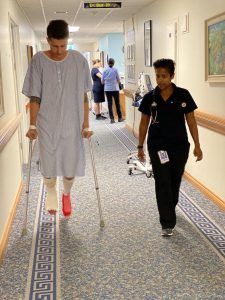
Surgery is a massive thing for a lot of people. If you have to have surgery for an injury or due to ongoing factors such as pain or instability, it’s important you have all the facts. Here is our “TPM Guide to Surgery“, to help you better understand how it all works.
What types of Surgery do we usually see in clinic at The Physio Movement?
Our post-surgical caseload is mainly orthopaedic. However, our Women’s Health physio, Lizzy, also sees a high number of patients following gynaecological surgery. Our team is also experienced in other surgeries, like abdominal surgery.
The most common orthopaedic surgeries we see are usually ACL reconstructions, ankle ligament reconstructions, shoulder reconstructions, along with knee and hip replacements. Not all surgeries are sporting or injury-related!
Do I really need Surgery?
This is a common question we hear coming through the clinic. To us, this is completely dependent on the patient. There is evidence suggesting that many orthopaedic injuries can benefit from conservative management, however it is our job to advise based on your personal situation whether it could be the best avenue for you. We have non-operative rehabilitation programs within the clinic, such as our GLA:D Knee + Hip Osteoarthritis Program, however again these programs aren’t always indicated. The decision to have surgery usually requires a conversation between you, your family, your surgeon and us, your physiotherapist, to discuss the best plan of action going forward.
If you sustain an injury playing sport – the best first port of call is your physio, who can refer you to your GP and onto the surgeon if they deem it necessary.
How can I prepare for Surgery?
Preparing for surgery is about ensuring that you can get the best outcomes after the operation. You can best do this by:
- Keeping active and healthy
- Working on a modified program with your physiotherapist
- Minimising inflammatory foods such as alcohol, and maintaining a healthy diet
- Potentially looking at weight loss methods if suffering from arthritis
- Improving your strength around the affected area, and minimising swelling and movement loss
What to expect following Surgery?
Following surgery you will initially wake up pretty groggy for the first few hours, up to a day or more (depending on your anaesthetic). After you are discharged from hospital, there may be a rest period required to help settle your pain and inflammation. Usually, there will be a post-operative follow-up appointment with your surgeon. At this point, you might be referred to physiotherapy to assist with your recovery.
How does Physio help post surgery?
Physiotherapy is important in:
- Rebuilding strength
- Regaining mobility
- Restoring joint range of motion (ROM)
- Minimising and reducing post-operative swelling
- Assisting in your return to activity, including sport
What other professionals might be involved in my rehab?
Depending on your surgery, your surgeon or physiotherapist may involve other team members to help in your rehabilitation, to get the best possible outcome. These may include:
- Exercise Physiologist – to help with later stage rehab, weight loss methods and rebuilding strength and condition.
- Dietitian – to ensure that your diet meets the requirements of your rehab, or maybe assist with weight loss where required.
- Occupational Therapist – in some elderly patients where access in the home is difficult, an OT may be able to help here.
How long will my recovery take following surgery?
How long is a piece of string?! Everyone’s recovery is different, depending on individual factors such as age, pre-operative condition, motivation, the surgery performed and co-morbidities. The team here at TPM will help to outline your post-operative plan as best as possible for you, however at times there may be bumps in the road that can slow or advance your progression.
Written by Jordan Ginard ~ Senior Physiotherapist
If you’d like to know more about how TPM can enhance your surgical out comes and assist pre + post operative, CLICK HERE to book your Pre or Post-Surgical Consult with our team today.
Do you need more advice on your injury and recovery? Call 1300 TPM FIT and speak to one of our professionals for more advice!


